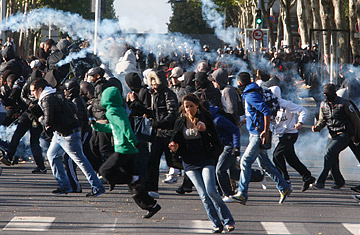
A crowd moves away from tear gas during a clash with riot police over the proposed raising of the retirement age from 60 to 62, in Nanterre, near Paris, on Wednesday, Oct. 20, 2010
President Nicolas Sarkozy drew chaotic events in France to a close last week by sending riot police to clear blockades of striking oil-refinery workers, getting gasoline flowing to thousands of dry service stations. For good measure, he also warned students clashing with police that they'd be punished to the fullest extent of the law for getting violently out of line. Yet as the new week opened, there was little evidence that Sarkozy's offensive had taken any steam out of either of those camps or the broader movement of opposition to his pension reform. Now the country waits to see if nationwide strikes and demonstrations on Oct. 28 and Nov. 6 will continue to mobilize millions even as Sarkozy's reform heads toward all but certain passage into law — or if, as conservatives hope, the protests fizzle out in the face of the government's resolve.
So far, the most dramatic effect of the ongoing protests has been a gasoline shortage provoked by nearly three weeks of strikes by oil-refinery workers. Although repeated police intervention since Oct. 22 has succeeded in unblocking those compounds temporarily, many have been shut down again later by renewed strikes, and refineries elsewhere in France are being shuttered by protesters. The result is that roughly 25% of all French service stations were dry Monday, Oct. 25, with Paris and the western part of France worst hit. Continuing walkouts have also left train traffic reduced, by 10%, to 30% of normal flow — though that's an improvement over recent weeks. But in other sectors, opposition to the government's reform is ramping up. Garbage collectors in a number of towns around France have replicated the strikes that have left Marseilles buried in two weeks' worth of refuse, and dockers in several ports have brought shipping to a crawl.
The upshot, French Economy Minister Christine Lagarde said on Monday, is that the strikes are now costing France $280 million to $556 million per day in lost business. All told, she said, the protesters — who oppose a reform that would increase the minimum retirement age from 60 to 62 and the age to qualify for a full pension from 65 to 67 — have thus cost France up to $4.4 billion in the nearly two months of recurring labor unrest. Speaking on Europe 1 radio, Lagarde warned that the prolonged instability threatens to undermine France's slow return to robust economic growth. "We exited the recession in rather good condition, and we mustn't weigh recovery down with movements painful to the French economy, particularly to some smaller and medium-sized businesses," she said.
It's unlikely that unions will heed Lagarde's caution as they continue to vote on the daily renewal of walkouts ahead of the nationwide shows of force scheduled for Oct. 28 and Nov. 6. Meanwhile, students are planning to launch new protests Oct. 26. Those demonstrations should provide some evidence as to whether, as the government has hoped, their ranks have been seriously thinned out by school vacations that began Oct. 23, or whether they can still create sufficient chaos to keep up the pressure on Sarkozy and his backers. The participation of young people in opposition to past French reforms has been vital in forcing repeated government climbdowns, and observers say the continued presence of students this time will be key to how long the large protest movement can endure.
For its part, the government is hoping that any continued opposition will quickly deflate when faced with legislative finality. The text of the reform was passed by the upper house of Parliament on Oct. 23 and is now set for final approval by a mixed committee of both chambers — both of them conservative-dominated — on Oct. 27. Sarkozy's government expects the fait accompli to leave many opponents figuring that, since the bill needs only Sarkozy's signature to become law, further demonstrations are a waste of time. "After the vote on the law, it's law [and] it must be respected," said Labor Minister Eric Woerth on France 3 television on Oct. 24. "Striking today accomplishes nothing."
Maybe not — apart from inflicting millions of dollars of daily pain on the economy, forcing motorists to scramble to find service stations with gas in their pumps and threatening public-transport users with new disruptions. And it's not just the French public who are paying the price. Though polls show that a large majority of French know that their country's deficit-plagued pension system must be overhauled, nearly two-thirds call Sarkozy's version of reform "unfair." And yet new polls published on Oct. 25 show that while 63% of respondents still support the opposition strikes and demonstrations, that backing has gradually fallen over time — from 71% two weeks ago and 69% last week.
But the unions aren't the only ones slipping in public esteem. A new Ipsos survey revealed Sunday finds Sarkozy's approval rating at just 29% — the first time he has ever dipped below 30% in that poll. The question is, Can Sarkozy afford to risk a further souring of public opinion by continuing to push through the reform? And does he even care?
